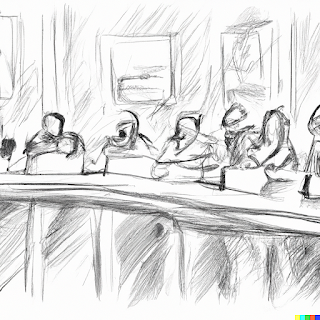Deliberative Thoughts Part 3: The Reactions of Excitement or Escape
Overwhelmingly, when I mentioned that I had grand jury duty, I was met with two responses, nearly straight down the line. In fact, I can remember any other reaction that did not fall into these two buckets. A few folks did ask how I felt about it before reacting, but when their thoughts were shared, they were typically these buckets.
An upfront note here: While I’m going to break down and explore these responses, they are not critiques of the individuals themselves. People are people and they’re often doing some level of projection of their own thoughts. They also might not be fully sharing (intentionally or unintentionally), what they bring to the conversation that leads them to that thought. But in the collective, the frequency of similar responses tells me there’s something deeper to consider about our society and how we think about certain things (like jury duty, justice, democracy, etc). TLDR: If you’re one of the folks reading this who had one of these reactions, this blog post is NOT about you.

Image created by DALLE-2
“How are you gonna get out of it?”
Right out of the gate, a strong amount of folks were quick to dismiss it and look for a means of getting out of it. People told me that I could (or should) get out of it. They told me to explain my views of how white supremacy permeates the political, social, and criminal justice systems making it an impossible system to deliver any real justice or my views on prison abolition to disqualify myself. People told me to lie. People shared their strategies of what clothes to wear (wear a BLM or anarchism rules T-shirt, one person told me). Others told me to tell the judge that my work was too important and no one could fill it at this crucial point in the semester.
I’m struck by this reaction. For some, this reflected a desire to avoid the inconvenience and disruption to one’s life (6 weeks at $25 a day) if one had pallid faith in the justice system. For others, it was just one more thing to conceptualize into their days in lives that are already over-prescribed because, yay, capitalism.
I can agree that there might be some reluctance but there was also a sense of privilege; a sense that ‘I don’t have to deal with this” and that they had the means to do so. That definitely rubbed my sense of fairness in the wrong way. Like for all we talk about doing the right thing, the desire to avoid responsibilities when given the chance seemed strong in many folks.
I’m sorry.
Another response included people who told me they were sorry I had six weeks of jury duty. The “sorry” came from different places. There was the “sorry” that felt like I had told them I just stubbed my toe. Other “sorry’s” were akin to my sharing that I had just gotten COVID. Some sorries were from the disruptive element that 6 weeks represented. And, of course, sometimes the “sorry” had the weight of someone dying.
These felt like the most empathic responses; recognizing the unexpected disruption to one’s life and giving room for something more. But it still felt strange to have people apologize to you for a civic duty.
Oh, it must be so interesting.
I had my own internal and visceral reaction when someone said that it would be interesting. Interesting is an overused term and has become a euphemism for many different things. For instance, it’s a great hedging term to hide what one really means. It intentionally masks a deeper opinion that one might be hesitant to share. And yes, it can be straightforward but rhetorically, it’s come to be a covering term–kind of like “nice”. It often says, “I’m saying something but nothing that holds me accountable or shows my deeper sentiment.”
More importantly, my internal and visceral reaction was grounded in the idea that getting to make decisions that could impact them for decades of their lives needed something strong consideration than interesting. “Interesting” strikes me as a level of engagement as a passive observer; someone who gets to watch and enjoy; someone who has the power to turn off whatever they want and does not have to feel like they have any stake in the game.
When I hear “interesting” about serving jury duty it brings to mind watching reality TV or one of the bajillion courtroom/police procedural shows that permeate our television landscape. Interesting feels consumptive–like the goal is to be entertained or walk away with a story or two–something like street cred in office conversation about the next time there’s a crime and one can weigh in because they had the interesting opportunity to serve on a jury.
What I Actually Felt
When I first got the notice about grand jury duty, I was a little bit excited. Civic duty and all that. I like the idea of being part of a society that asks something more of its citizenry than taxes–the idea of commitment to one’s society; having more connection to understanding how things operate. And too, scenes from Reginald Rose’s 12 Angry Men circled in my head, calling back to when I did my Associate’s Degree in Criminal Justice in the early 2000s. Also, a part of me wondered about what I might see and experience during this time and how that might impact my thinking.
Did you enjoy this read? Let me know your thoughts down below or feel free to browse around and check out some of my other posts!. You might also want to keep up to date with my blog by signing up for them via email.
 This work is licensed under a Creative Commons Attribution-ShareAlike 4.0 International License.
This work is licensed under a Creative Commons Attribution-ShareAlike 4.0 International License.
Comments
Post a Comment